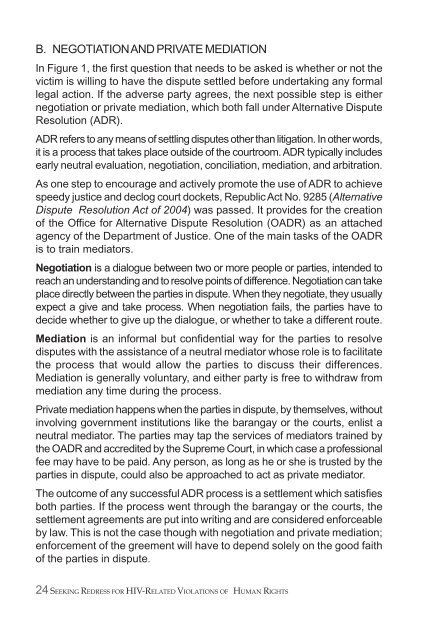Download this publication - AIDS Data Hub
Download this publication - AIDS Data Hub
Download this publication - AIDS Data Hub
- No tags were found...
Create successful ePaper yourself
Turn your PDF publications into a flip-book with our unique Google optimized e-Paper software.
B. NEGOTIATION AND PRIVATE MEDIATIONIn Figure 1, the first question that needs to be asked is whether or not thevictim is willing to have the dispute settled before undertaking any formallegal action. If the adverse party agrees, the next possible step is eithernegotiation or private mediation, which both fall under Alternative DisputeResolution (ADR).ADR refers to any means of settling disputes other than litigation. In other words,it is a process that takes place outside of the courtroom. ADR typically includesearly neutral evaluation, negotiation, conciliation, mediation, and arbitration.As one step to encourage and actively promote the use of ADR to achievespeedy justice and declog court dockets, Republic Act No. 9285 (AlternativeDispute Resolution Act of 2004) was passed. It provides for the creationof the Office for Alternative Dispute Resolution (OADR) as an attachedagency of the Department of Justice. One of the main tasks of the OADRis to train mediators.Negotiation is a dialogue between two or more people or parties, intended toreach an understanding and to resolve points of difference. Negotiation can takeplace directly between the parties in dispute. When they negotiate, they usuallyexpect a give and take process. When negotiation fails, the parties have todecide whether to give up the dialogue, or whether to take a different route.Mediation is an informal but confidential way for the parties to resolvedisputes with the assistance of a neutral mediator whose role is to facilitatethe process that would allow the parties to discuss their differences.Mediation is generally voluntary, and either party is free to withdraw frommediation any time during the process.Private mediation happens when the parties in dispute, by themselves, withoutinvolving government institutions like the barangay or the courts, enlist aneutral mediator. The parties may tap the services of mediators trained bythe OADR and accredited by the Supreme Court, in which case a professionalfee may have to be paid. Any person, as long as he or she is trusted by theparties in dispute, could also be approached to act as private mediator.The outcome of any successful ADR process is a settlement which satisfiesboth parties. If the process went through the barangay or the courts, thesettlement agreements are put into writing and are considered enforceableby law. This is not the case though with negotiation and private mediation;enforcement of the greement will have to depend solely on the good faithof the parties in dispute.24 SEEKING REDRESS FOR HIV-RELATED VIOLATIONS OF HUMAN RIGHTS















